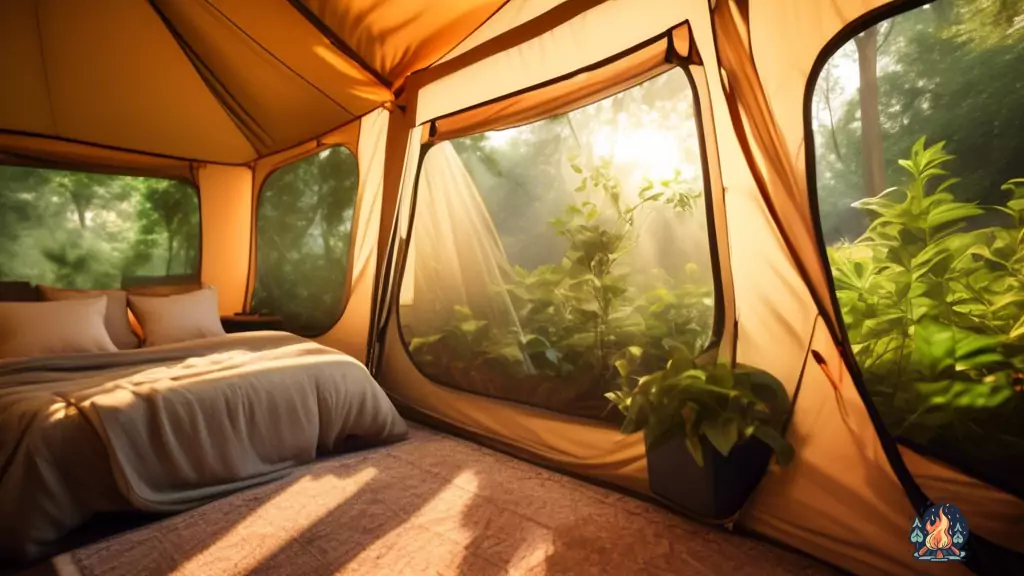The Importance Of Tent Ventilation: Stay Comfortable In Any Weather
by Kevin Fairbanks • Updated: January 30, 2024
Stay comfortable in any weather with proper tent ventilation. Click now for essential tips on staying cool, dry, and cozy during your outdoor adventures. Don’t miss out on the importance of tent ventilation!

Are you tired of feeling like you’re camping in a sauna or a freezer? Well, fret no more, because we have the ultimate solution to all your tent-related woes: proper tent ventilation! Yes, you heard it right. Ventilation is the unsung hero of tent design, the key to staying comfortable in any weather. It’s not just a luxury; it’s an absolute necessity, and we’re here to tell you why.
Picture this: you’re out in the wilderness, ready to embark on a thrilling adventure. The sun is scorching, and you can practically feel the heat radiating off the ground. You step into your tent only to be greeted by a suffocating wave of hot, stale air.
But fear not, dear camper, for proper ventilation can turn this nightmare into a delightful daydream. Ventilation not only allows fresh air to circulate inside the tent, but it also helps to regulate the temperature, making it feel like a cozy oasis amidst the blazing heat.
So, get ready to bid farewell to those sleepless nights spent tossing and turning, as we delve into the importance of tent ventilation and how it can make your camping experience a breath of fresh air.
Key Takeaways
- Tent ventilation is crucial for a comfortable camping experience.
- Proper tent ventilation helps to keep bugs and itchiness at bay.
- Choosing a tent with excellent ventilation is essential for comfort and sanity.
- Good tent ventilation is important in all types of weather.
Understanding the Role of Ventilation in Tent Design
Understanding the role of ventilation in tent design is crucial to ensuring maximum comfort and adapting to different weather conditions.
Picture this: you’re out in the wilderness, surrounded by towering trees and chirping birds. You set up your tent, excited for a night of restful sleep. But wait, what’s that? The temperature is rising, and you can feel the sweat forming on your forehead. Oh no, it’s going to be a sauna in there!
That’s where ventilation comes to the rescue, my friend. It’s like having your own personal air conditioner, except instead of blowing cold air, it’s blowing fresh air into your tent. With proper ventilation, you can say goodbye to stuffiness and hello to a cool and breezy camping experience.
But it’s not just about the temperature, oh no. Ventilation also plays a crucial role in keeping your tent dry and free from condensation. Imagine waking up in the morning, ready to tackle the day’s adventures, only to find your tent damp and musty. Yuck! Nobody wants to spend the day in a damp tent, feeling like they’re sleeping in a swamp.
That’s where ventilation comes in like a superhero, saving the day once again. By allowing air to circulate, ventilation helps to prevent moisture build-up, keeping your tent fresh and dry.
So, my friend, next time you’re setting up your tent, remember the importance of ventilation. It’s not just a fancy feature, it’s a necessity for your comfort and enjoyment. With proper ventilation, you’ll stay cool, dry, and comfortable in any weather.
Happy camping!
The Benefits of Proper Air Circulation
Proper air circulation in a tent ensures that fresh, cool breezes gently sweep away any stagnant, stuffy air. Imagine being trapped in a tent on a hot summer day, with sweat pouring down your face like a waterfall. It’s like being in a sauna, but without the luxury of a towel to wipe away the sweat.
But fear not, my friend, because with proper ventilation, you can avoid this sweaty mess. The gentle flow of air will whisk away the hot, humid air, leaving you feeling as fresh as a daisy in a field of… well, daisies.
But it’s not just about staying cool. Oh no, there’s more to it than that. Proper air circulation also helps to eliminate any unpleasant odors that may linger in your tent. Let’s face it, after a long day of hiking and exploring, you might not smell like a bed of roses. In fact, you might smell more like a gym locker.
But fear not, my friend, because with the magic of fresh air circulating through your tent, those odors will be a thing of the past. You’ll be able to breathe easy and sleep soundly, knowing that you won’t be waking up to the scent of your own sweaty socks.
So, my friend, don’t underestimate the power of proper air circulation in your tent. It’s not just about staying cool, it’s about staying comfortable in any weather. Whether you’re camping in the scorching heat of summer or the chilly depths of winter, ventilation is your best friend.
So open those vents, let the fresh air in, and embrace the comfort that comes with it. Your tent will thank you, and so will your nose.
Techniques for Maximizing Ventilation in Different Weather Conditions
How can you ensure optimal airflow within your tent in various weather conditions? Well, fear not, because I’ve got some tips that will blow you away! (Pun intended, of course).
- Open sesame: When the weather is hot and sunny, it’s time to unleash the power of your tent flaps. Open them wide and let the fresh air in. Not only will this help cool down your tent, but it will also give you a nice view of the great outdoors. Just be careful not to let any bugs sneak in!
- Rain, rain, go away: When the weather takes a turn for the wetter side, you might be tempted to seal up your tent like a fortress. But hold your horses! To maximize ventilation, open up your rainfly just a bit. This will allow for some airflow without letting the rain in. It’s like giving your tent a little umbrella of its own!
- The wind is your friend: When the wind starts to pick up, it’s time to get creative. Position your tent in a way that allows the wind to flow through it. You can even use rocks or other objects to prop open your tent flaps and create a wind tunnel effect. Just be careful not to turn your tent into a flying kite!
- Bundle up: When the temperatures drop, it’s all about insulation. Use a tent with a good rainfly and make sure all the zippers are closed tightly. This will help trap warm air inside your tent and keep you cozy throughout the night. You can even use a hot water bottle or a camping heater if you really want to go all out.
So, whether you’re facing scorching heat, pouring rain, gusty winds, or chilly nights, these techniques will help you maximize ventilation in your tent and keep you comfortable in any weather. Happy camping!
The Impact of Ventilation on Temperature and Condensation
Maximize your comfort and prevent condensation by ensuring proper ventilation in your tent. Let’s face it, nobody wants to wake up in a swampy sauna of a tent. It’s like trying to sleep in a rainforest, minus the exotic animals and beautiful scenery.
Without proper ventilation, the temperature inside your tent can skyrocket faster than a rocket taking off. And let me tell you, waking up covered in sweat and feeling like you just ran a marathon is not a great way to start your day. So, do yourself a favor and make sure there’s enough airflow in your tent to keep you cool and dry.
Not only does proper ventilation help regulate the temperature, but it also prevents condensation from turning your tent into a dripping wet mess. Trust me, waking up to a rainstorm inside your tent is not a fun experience. It’s like Mother Nature decided to play a prank on you, except you’re the one who gets soaked.
So, make sure those vents are open and the air can circulate freely. It’s like giving your tent a breath of fresh air, and who doesn’t love a breath of fresh air? Just remember, a well-ventilated tent is a happy tent, and a happy tent means a happy camper.
How does proper tent ventilation contribute to tent safety and security?
Proper tent ventilation is one of the essential tent safety tips to ensure a safe and secure camping experience. Good air circulation helps to reduce condensation and prevents the buildup of harmful gases inside the tent, promoting a safer environment for sleeping and living during outdoor adventures.
Choosing the Right Tent with Excellent Ventilation Features
Choosing the right tent with great ventilation features ensures a comfortable camping experience. You don’t want to find yourself stuck in a stuffy, airless tent, feeling like you’re slowly roasting in an oven.
No one wants to wake up in the morning feeling like a sweaty mess, with condensation dripping down the tent walls. So, to avoid these unpleasant scenarios, here are three reasons why choosing a tent with excellent ventilation is a must:
- Breathe in the fresh air: Picture this – you’re lying in your tent, surrounded by the beauty of nature, and all you can smell is your own stinky socks from yesterday’s hike. Not exactly the ambiance you were hoping for, right? Well, with a well-ventilated tent, you can bid farewell to the unpleasant odors and instead fill your lungs with the crisp, fresh air of the great outdoors. Ahh, now that’s the way to sleep under the stars!
- No more night sweats: We’ve all had those nights when we wake up in a puddle of sweat, wondering if we’ve accidentally stumbled into a sauna instead of our tent. But fear not, my friend! With a tent that has excellent ventilation, you can say goodbye to those dreaded night sweats. The airflow will keep you cool and comfortable throughout the night, allowing you to wake up feeling refreshed and ready for a day of adventure.
- Keep the bugs at bay: Let’s face it – bugs are the uninvited guests of any camping trip. They buzz around your head, crawl up your legs, and give you itchy bites that last for days. But here’s the good news: a well-ventilated tent can help keep those pesky bugs outside where they belong. The airflow will create a barrier between you and the creepy crawlies, ensuring a bug-free and itch-free camping experience. Now, that’s something to celebrate!
So, when you’re choosing your next tent, don’t forget to prioritize excellent ventilation. Your comfort, sanity, and bug-free status depend on it!
Frequently Asked Questions
Can I use a tent without ventilation in all weather conditions?
No way, buddy! Using a tent without ventilation in any weather conditions is a recipe for disaster. You’ll be a sweaty, smelly mess in the heat and a condensation-covered icicle in the cold. Don’t do it!
How can I tell if my tent has proper air circulation?
To check if your tent has proper air circulation, look for features like mesh panels, windows, or vents. These allow fresh air to flow in and hot air to escape, keeping you cool and preventing condensation. No sweaty tent parties here!
Are there any specific techniques for maximizing ventilation in extremely hot weather?
To maximize ventilation in scorching heat, try these tricks: open all windows and vents, use a portable fan, hang wet towels inside, or create a DIY swamp cooler with ice and a fan. Stay cool, camper!
Does ventilation impact the durability of a tent?
Yes, ventilation can actually improve the durability of your tent. Proper airflow helps to prevent condensation, which can lead to mold and mildew. So not only will you stay comfortable, but your tent will last longer too!
Is it possible to have too much ventilation in a tent?
Yes, it’s possible to have too much ventilation in a tent. You’ll feel like you’re camping in a wind tunnel! Just imagine your hair blowing in all directions and your sleeping bag doing acrobatics. It’s like a circus in there!

Hi, I’m Kevin, a lifelong camping enthusiast and the voice behind Campfire Discoveries. From tent to RV to cabin camping, I’ve explored it all. Join me as we share stories and tips around the campfire, deepening our connection with the great outdoors.
Keep Reading
-
Best Campfire Cooking Grills For Outdoor Cooking
Unleash your inner chef with the best campfire cooking grills for outdoor adventures. Elevate your cooking game and make delicious meals under the stars. Find the perfect grill for you now!
-
Easy RV Meals: Delicious Recipes For Life On The Road
Looking for delicious and easy RV meals? Check out our mouthwatering recipes for life on the road. Get inspired and satisfy your taste buds with these easy RV meals today!
-
The Ultimate RV Packing Checklist For Beginners
Get ready for your next RV adventure with our ultimate RV packing checklist for beginners! Don’t hit the road without being fully prepared. Check out our guide and start packing today!



